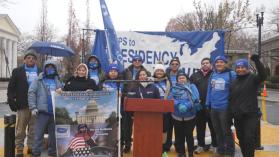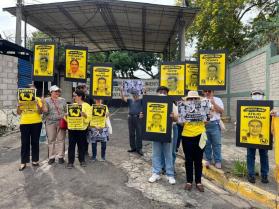Changes in Motion: El Salvador's Adult Literacy Circles
“I used to have to ask people about which bus routes were which; I couldn’t read which bus I was getting on. My goals in this program are to be able to know which buses I am getting on, and to be able to sign my name. I want to be able to read the Bible.” - Juliana Alvarenga, participant in an FMLN-sponsored literacy circle in Cojutepeque, Cuscatlán, El Salvador
Since the 2009 election of FMLN president Mauricio Funes, perhaps the most popular and impactful gains that the administration have made have been in the sphere of education. Among the most outstanding of these education programs crafted by Vice president and Minister of Education Salvador Sánchez Cerén is a nation-wide campaign to eliminate adult illiteracy in the country by 2021.
Currently in El Salvador, there are roughly 689,500 people (out of a total population of about 6 million) age 15 or over who cannot read or write - about 17.9% of the total population, most of whom are women. Since the program's start in 2010, there have been 4 municipalities that have officially eradicated illiteracy, and many more are fast approaching this point. As of today, over 120,000 have been incorporated into this revolutionary program.
“Literacy is clearly a labor of love," said Vice-president Sánchez Cerén, “because it is a manifestation of brotherhood and human solidarity. In addition, literacy encourages sustainable development…and reading promotes knowledge, and knowledge multiplies the opportunities to transform one’s reality…The permanence and progression of this situation [of illiteracy] is a violation of basic human rights."
Drawing deeply from the national literacy campaigns in Nicaragua and Cuba, as well as the work of revolutionary educator Paolo Freire, the campaign has been waged by the Ministry of Education staff that has enlisted over 23,000 volunteers, many of them high school and college students, to implement the program on the national level. The literacy circles meet for 2 hours a day, 5 days a week in modules of 5 months. “When I started, people didn’t even know how to hold a pencil, and many of their hands trembled,” one volunteer teacher in Cojutepeque shared. “And they’ve learned the alphabet, even learned how to read some things already, even though we’ve only been at it for a month and a half.” Many program volunteers teach in two literacy circles in their community, committing at least 4 hours per weekday, plus additional time on the weekends. Vice-president Sánchez-Cerén has commended the work of these young volunteers, recognizing their “grand gesture of love and solidarity towards others.”
The program, called “Yo sí puedo” (“Yes, I Can”), has 3 levels that, when completed, provide the equivalent of a sixth grade education in reading, writing, and math skills. Currently, the majority of literacy circles are at the first level which is designed to educate participants to a first and second grade reading level. In addition to the in-person literacy teachers, lessons are broadcast over community radio stations to reach those unable to arrive in person. There are also a number of programs designed to meet the specific needs of a diverse population; for the incarcerated, for women working in the market, and for people with special needs. Currently there are at least 2,644 prisoners that have already or are now participating in the literacy program, and 51 circles for Salvadorans with special needs, including 13 circles for deaf individuals and 14 for people with visual impairments.
CISPES invites you to join us in supporting the inspirational National Literacy Program this June 23 - July 15 as part of our Literacy Brigade. Click here for more information.

 "I am a CISPES supporter because continuing to fight for social justice and a more people-centered country means continuing the dream and sacrifice of thousands of my fellow Salvadorans who died for that vision.” - Padre Carlos, New York City
"I am a CISPES supporter because continuing to fight for social justice and a more people-centered country means continuing the dream and sacrifice of thousands of my fellow Salvadorans who died for that vision.” - Padre Carlos, New York City

